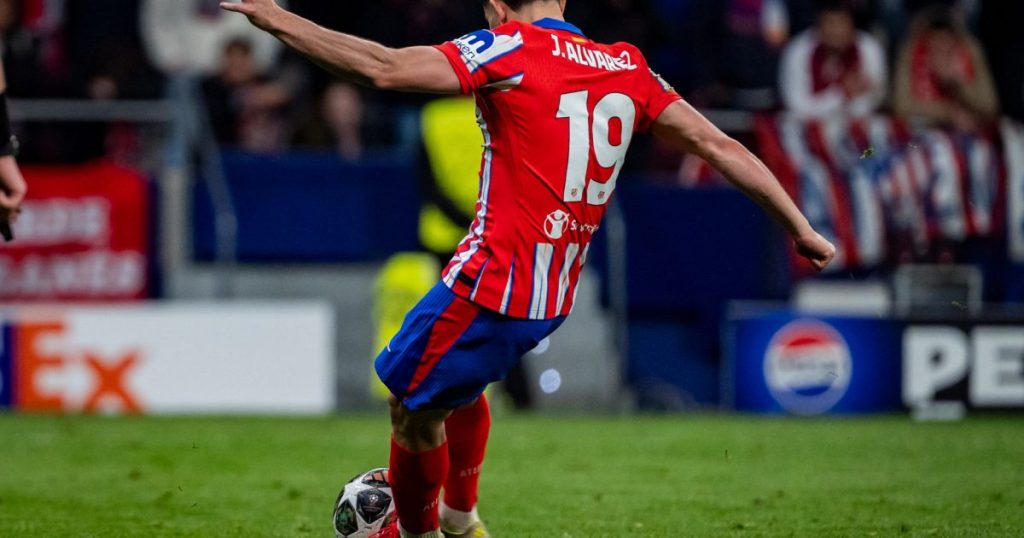The world of football witnessed a significant rule change regarding penalty kicks in the aftermath of a controversial incident during a high-stakes UEFA Champions League match between Atlético Madrid and Real Madrid. The controversy stemmed from the disallowance of a penalty kick taken by Atlético Madrid’s Julián Álvarez during a crucial shootout in March. Álvarez’s attempt, which resulted in the ball finding the back of the net, was deemed invalid due to what was perceived as a “double touch.” This decision, which ultimately contributed to Atlético Madrid’s elimination from the competition, sparked immediate debate and prompted the club to formally protest the ruling to UEFA. The governing body subsequently reviewed the rule and implemented a significant change, altering the way such situations will be handled in the future.
The crux of the controversy revolved around the interpretation of the “double touch” rule. Previously, if a penalty taker inadvertently made contact with the ball twice during their kick, the attempt was automatically considered a miss, regardless of whether the ball crossed the goal line. In Álvarez’s case, despite successfully scoring, the referees judged that he had touched the ball twice – likely with both feet in quick succession – and disallowed the goal. This interpretation of the rule, while technically correct at the time, ignited a firestorm of debate, with many arguing that the spirit of the game and the intention of the kicker should be considered. Critics argued that penalizing a player for an unintentional double touch, particularly when the kick results in a goal, was excessively harsh and potentially game-changing, as it was in this instance for Atlético Madrid.
The outcry following the incident, coupled with Atlético Madrid’s formal protest, prompted UEFA to re-evaluate the rule and its potential implications. Recognizing the potential for injustice in such scenarios, the football governing body decided to amend the regulation. The revised rule now stipulates that if a penalty taker unintentionally strikes the ball with both feet during their attempt and the ball subsequently enters the goal, the penalty will be retaken rather than being declared a miss. This modification represents a significant shift in how double touches are treated, moving away from the strict, black-and-white interpretation to a more nuanced approach that considers the unintentional nature of the infraction.
The change signifies a move towards prioritizing fairness and mitigating the risk of unjustly penalizing players for incidental contact during penalty kicks. By allowing a retake in cases of unintentional double touches that result in a goal, UEFA has addressed a key concern raised by the Álvarez incident, preventing similar controversies from arising in the future. This amendment acknowledges that the primary objective of a penalty kick is to determine whether the kicker can successfully place the ball in the net, and that unintentional double touches, while technically violations, should not automatically negate a successful attempt. The emphasis now shifts towards the intent of the kicker, ensuring that players are not unfairly penalized for slight technical errors that do not significantly impact the outcome of the kick.
The revised rule offers a more balanced approach to officiating penalty kicks. It recognizes the high-pressure nature of these situations and the possibility of unintentional errors while upholding the integrity of the game. By permitting a retake, UEFA has introduced a more equitable solution that benefits both the attacking and defending teams. It removes the harsh consequence of an automatic miss for the attacking team while still providing the defending team with another opportunity to prevent a goal. This balanced approach reflects a growing trend in football officiating, moving away from rigid interpretations of the rules towards a more pragmatic and context-sensitive application of the laws of the game.
In conclusion, the modification to the double-touch rule for penalty kicks represents a positive development in the evolution of football regulations. The change was prompted by a controversial incident that highlighted the potential for unfair outcomes under the previous rule. UEFA’s decision to amend the regulation demonstrates a willingness to adapt and refine the laws of the game, ensuring fairness and preventing the repetition of similar controversies. By allowing a retake instead of declaring an automatic miss for unintentional double touches that result in a goal, UEFA has struck a more equitable balance, prioritizing the intent of the kicker and the overall spirit of the game. This change is a welcome step towards a more nuanced and just application of the rules, ultimately enhancing the integrity and fairness of football.


